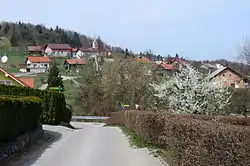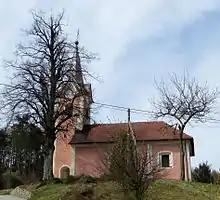Gradišče, Škofljica
Gradišče (pronounced [ɡɾaˈdiːʃtʃɛ]) is a settlement in the hills south of Pijava Gorica in the Municipality of Škofljica in central Slovenia. The municipality is part of the traditional region of Lower Carniola and is now included in the Central Slovenia Statistical Region.[2]
Gradišče
Gradišče nad Pijavo Gorico | |
|---|---|
 | |
 Gradišče Location in Slovenia | |
| Coordinates: 45°55′34.61″N 14°35′8.59″E | |
| Country | |
| Traditional region | Lower Carniola |
| Statistical region | Central Slovenia |
| Municipality | Škofljica |
| Area | |
| • Total | 1.5 km2 (0.6 sq mi) |
| Elevation | 533.8 m (1,751.3 ft) |
| Population (2012) | |
| • Total | 773[1] |
| • Density | 516/km2 (1,340/sq mi) |
| Time zone | UTC+01 (CET) |
| • Summer (DST) | UTC+02 (CEST) |
Name
The name of the settlement was changed from Gradišče to Gradišče nad Pijavo Gorico in 1953[3] and then again back to Gradišče in January 2008.[4] At the same time a street system was introduced, with most streets now bearing Roman numerals. Before this all properties had numbers for the village with no individual street names.
History
As its name suggests (in Slovene: Gradišče means 'fortified hillfort'), archaeological excavations have revealed the site of a large prehistoric Late Bronze Age and Early Iron Age settlement with associated earthworks and a burial ground.[5]
Church

The local church is dedicated to Saints Primus and Felician and belongs to the Parish of Želimlje. It was originally a 12th-century Romanesque building that was restyled in the Baroque style in the 17th century.[6]
References
- http://www.stat.si/eng/krajevnaimena/default.asp?txtIme=GRADI%8A%C8E&selNacin=celo&selTip=naselja&ID=4415
- Škofljica municipal site
- Spremembe naselij 1948–95. 1996. Database. Ljubljana: Geografski inštitut ZRC SAZU, DZS.
- Odlok o preimenovanju naselja Gradišče nad Pijavo Gorico. Ljubljana: Uradni list RS, št. 1/2008. 2008. p. 94.
- Slovenian Ministry of Culture register of national heritage reference number ešd 16739
- Slovenian Ministry of Culture register of national heritage reference number ešd 2720
